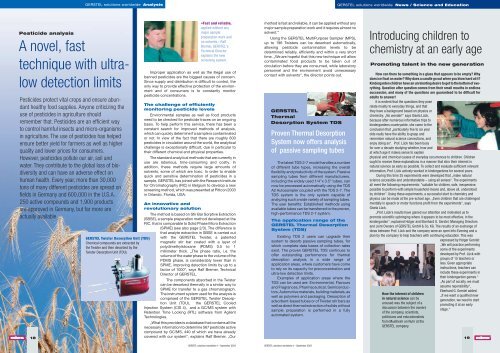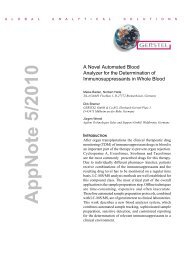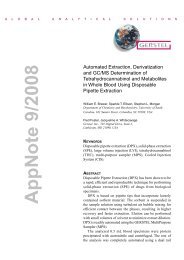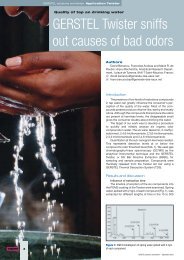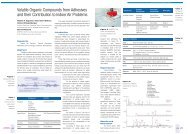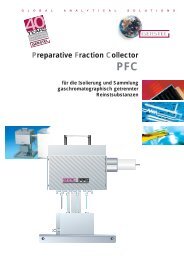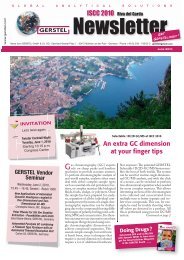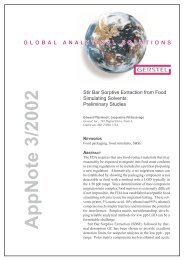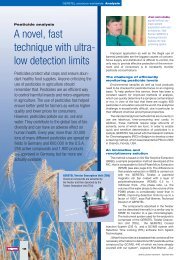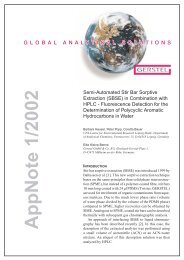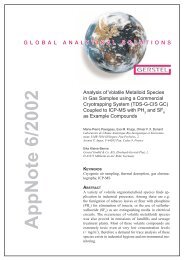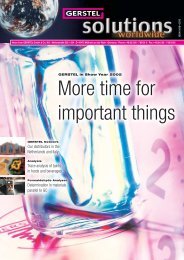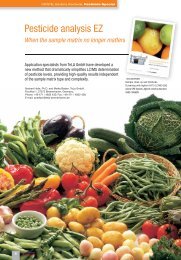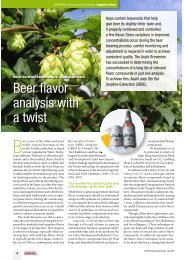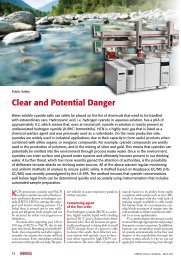GERSTEL Solution no 4
GERSTEL Solution no 4
GERSTEL Solution no 4
You also want an ePaper? Increase the reach of your titles
YUMPU automatically turns print PDFs into web optimized ePapers that Google loves.
<strong>GERSTEL</strong> solutions worldwide Analysis<br />
<strong>GERSTEL</strong> solutions worldwide News / Science and Education<br />
Pesticide analysis<br />
A <strong>no</strong>vel, fast<br />
technique with ultralow<br />
detection limits<br />
Pesticides protect vital crops and ensure abundant<br />
healthy food supplies. Anyone criticizing the<br />
use of pesticides in agriculture should<br />
remember that. Pesticides are an efficient way<br />
to control harmful insects and micro-organisms<br />
in agriculture. The use of pesticides has helped<br />
ensure better yield for farmers as well as higher<br />
quality and lower prices for consumers.<br />
However, pesticides pollute our air, soil and<br />
water. They contribute to the global loss of biodiversity<br />
and can have an adverse effect on<br />
human health. Every year, more than 30,000<br />
tons of many different pesticides are spread on<br />
fields in Germany and 600,000 in the U.S.A.<br />
250 active compounds and 1,900 products<br />
are approved in Germany, but far more are<br />
actually available.<br />
18<br />
<strong>GERSTEL</strong> Twister Desorption Unit (TDU)<br />
Chemical compounds are extracted by<br />
the Twister and then desorbed by the<br />
Twister Desorption Unit (TDU).<br />
»Fast and reliable,<br />
applied without any<br />
major sample<br />
preparation work and<br />
<strong>no</strong> solvents.« Ralf<br />
Bremer, <strong>GERSTEL</strong>‘s<br />
Technical Director<br />
explains the new<br />
screening system.<br />
Improper application as well as the illegal use of<br />
banned pesticides are the biggest causes of concern.<br />
Since supply and distribution is difficult to control, the<br />
only way to provide effective protection of the environment<br />
and of consumers is to constantly monitor<br />
pesticide concentrations.<br />
The challenge of efficiently<br />
monitoring pesticide levels<br />
Environmental samples as well as food products<br />
need to be checked for pesticide traces on an ongoing<br />
basis. To help perform this service, there has been a<br />
constant search for improved methods of analysis,<br />
which can quickly determine if a sample is contaminated<br />
or <strong>no</strong>t. In view of the fact that there are roughly 600<br />
pesticides in circulation around the world, the analytical<br />
challenge is exceptionally difficult, due in particular to<br />
their different chemical and physical properties.<br />
The standard analytical methods that are currently in<br />
use are laborious, time-consuming and costly. In<br />
addition, these methods require large amounts of<br />
solvents, some of which are toxic. In order to enable<br />
quick and sensitive determination of pesticides in a<br />
sample, <strong>GERSTEL</strong> has joined with the Research Institute<br />
for Chromatography (RIC) in Belgium to develop a new<br />
screening method, which was presented at Pittcon 2003<br />
in Orlando, Florida, USA.<br />
An in<strong>no</strong>vative and<br />
revolutionary solution<br />
The method is based on Stir Bar Sorptive Extraction<br />
(SBSE), a sample preparation method developed at the<br />
RIC, that is comparable to Solid Phase Micro Extraction<br />
(SPME) (see also page 2/3). The difference is<br />
that analyte extraction in SBSE is carried out<br />
with the <strong>GERSTEL</strong> Twister, a patented<br />
magnetic stir bar coated with a layer of<br />
polydimethylsiloxane (PDMS) 0.5 to 1<br />
millimeter thick. „The phase ratio, i.e. the<br />
volume of the water phase to the volume of the<br />
PDMS phase, is considerably lower than in<br />
SPME, improving detection limits by up to a<br />
factor of 1000“, says Ralf Bremer, Technical<br />
Director of <strong>GERSTEL</strong>.<br />
The components absorbed in the Twister<br />
can be desorbed thermally in a similar way to<br />
SPME for transfer to a gas chromatograph.<br />
The instrument system used for the analysis is<br />
comprised of the <strong>GERSTEL</strong> Twister Desorption<br />
Unit (TDU), the <strong>GERSTEL</strong> Cooled<br />
Injection System (CIS 4), and a GC/MS system with<br />
Retention Time Locking (RTL) software from Agilent<br />
Tech<strong>no</strong>logies.<br />
„What this provides is a database that contains all the<br />
necessary information to determine 567 pesticide active<br />
compound by GC/MS, 440 of which we have already<br />
covered with our system“, explains Ralf Bremer. „Our<br />
<strong>GERSTEL</strong> solutions worldwide 4 – September 2003<br />
method is fast and reliable, it can be applied without any<br />
major sample preparation work and it requires almost <strong>no</strong><br />
solvent.“<br />
Using the <strong>GERSTEL</strong> MultiPurpose Sampler (MPS),<br />
up to 196 Twisters can be desorbed automatically,<br />
allowing pesticide contamination levels to be<br />
determined reliably, efficiently and within a very short<br />
time. „We are hopeful that this new technique will allow<br />
contaminated food products to be taken out of<br />
circulation before they are consumed, while laboratory<br />
personnel and the environment avoid unnecessary<br />
contact with solvents“, the director points out.<br />
<strong>GERSTEL</strong><br />
Thermal<br />
Desorption System TDS<br />
Proven Thermal Desorption<br />
System <strong>no</strong>w offers analysis<br />
of passive sampling tubes<br />
The latest TDS 2-7 model handles a number<br />
of different tube types, increasing the overall<br />
flexibility and productivity of the system. Passive<br />
sampling tubes from different manufacturers,<br />
including the widely used 1/4’’x 3.5’’ tubes, can<br />
<strong>no</strong>w be processed automatically using the TDS<br />
A2 Autosampler coupled with the TDS 2-7. The<br />
TDS system is the only system capable of<br />
analyzing such a wide variety of sampling tubes.<br />
The user benefits: Established methods using<br />
available tubes can be transferred to the proven,<br />
high-performance TDS 2-7 system.<br />
The application range of the<br />
<strong>GERSTEL</strong> Thermal Desorption<br />
System (TDS)<br />
Existing TDS 2 users can upgrade their<br />
system to desorb passive sampling tubes, for<br />
which complete data bases of collection rates<br />
exist. The proven <strong>GERSTEL</strong> TDS continues to<br />
offer outstanding performance for thermal<br />
desorption analysis in a wide range of<br />
application areas, where customers have come<br />
to rely on its capacity for preconcentration and<br />
ultra-low detection limits.<br />
Examples of application areas where the<br />
TDS can be used are: Environmental, Flavours<br />
and Fragrances, Pharmaceutical, Semiconductors,<br />
Automotive materials, building materials, as<br />
well as polymers and packaging. Desorption of<br />
adsorbent-based tubes or of Twister stir bars as<br />
well as direct thermal extraction of solids without<br />
sample preparation is performed in a fully<br />
automated system.<br />
<strong>GERSTEL</strong> solutions worldwide 4 – September 2003<br />
Introducing children to<br />
chemistry at an early age<br />
Promoting talent in the new generation<br />
How can there be something in a glass that appears to be empty? Why<br />
does ice float on water? Why does a candle go out when you blow hard at it?<br />
Kindergarden children have an unrelenting desire to get to the bottom of everything.<br />
Question after question comes from their small mouths in endless<br />
succession, and many of the questions are guaranteed to be difficult for<br />
adults to answer!<br />
It is evident that the questions they pose<br />
relate mostly to everyday things, and that<br />
they have a background based on physics or<br />
chemistry. „No wonder!“ says Gisela Lück,<br />
because after numerous informative trips to<br />
kindergardens countrywide, she came to the<br />
conclusion that „particularly five to six year<br />
olds really have the ability to grasp and<br />
remember natural science connections, and<br />
enjoy doing so“. Prof. Lück has been busy<br />
for over a decade studying whether, how and<br />
at which age it makes sense to explain<br />
physical and chemical causes of everyday occurrences to children. Children<br />
ought to receive these explanations in a manner that stirs their interest in<br />
natural science as early as possible. To collect and evaluate sufficient relevant<br />
information, Prof. Lück actively worked in kindergardens for several years.<br />
During this time 25 experiments were developed that „make natural<br />
science accessible and understandable – using all senses“. The experiments<br />
all meet the following requirements: ”suitable for children, safe, inexpensive,<br />
possible to perform with simple household means and, above all, understood<br />
by children”. Using these experiments, a successful start to chemistry and<br />
physics can be made at the pre-school age. „Even children that are challenged<br />
mentally in speech or motor functions profit from the experiments“, says<br />
Gisela Lück.<br />
„Prof. Lück’s results have gained our attention and motivated us to<br />
promote scientific upbringing where it appears to be most effective, in the<br />
kindergarden“, explained Holger and Eberhard G. Gerstel, Managing Directors<br />
and Joint Owners of <strong>GERSTEL</strong> GmbH & Co. KG. The results of an exchange of<br />
ideas between Prof. Lück and the company were an open Info-Evening and a<br />
plan by the company to help teachers with continuing education. This was<br />
expressed by Holger Gerstel:<br />
„We will practice performing<br />
some of the experiments<br />
developed by Prof. Lück with<br />
groups of 15 teachers or<br />
less. Given appropriate<br />
instructions, teachers can<br />
include these experiments in<br />
their kindergarden games.“<br />
„As part of society, we must<br />
assume reponsibility“,<br />
How the interest of children<br />
in natural science can be<br />
aroused was the subject of a<br />
discussion between the owners<br />
of the company, scientists,<br />
politicians and educationalists<br />
from Muelheim on Ruhr at the<br />
<strong>GERSTEL</strong> company.<br />
Eberhard G. Gerstel added:<br />
„If we want a qualified new<br />
generation, we need to start<br />
promoting it at an early<br />
stage.“<br />
19


